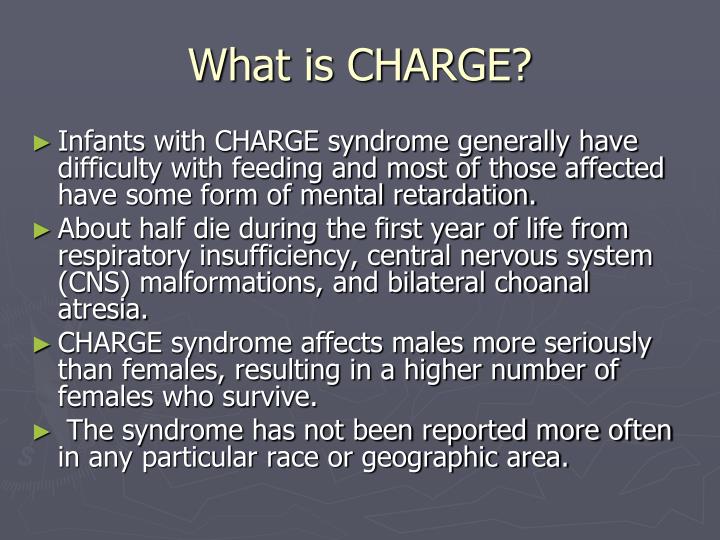
Williams, M.D., Department of Pediatrics, Gundersen Lutheran Medical Center 1836 South Ave., LaCrosse, WI 54601 (608)782-7300 X2363 TYPE AND FREQUENCY OF URINARY TRACT ANOMALIES IN CHARGE SYNDROME 20-40 have a urinary tract anomaly (1,4). Few familial cases of this syndrome have been reported and these were characterized by a wide. Treatment is symptomatic and alleviates life-threatening symptoms. CHARGE syndrome is an autosomal dominant condition that is caused by mutations in the CHD7 gene. The name CHARGE is an acronym for the most common symptoms associated with the condition. Most cases are sporadic, but, in rare instances, transmission from a mildly affected parent has been reported. CHARGE syndrome is a genetic condition that affects many parts of your child’s body including their heart, nerves, genitals, eyes and ears.

These patients highlight the importance of facial gestalt in the accurate identification of MWS when less common features are present.ĬHARGE syndrome Mowat-Wilson syndrome craniosynostosis intellectual disability minor malformations. This section of the website covers CHARGE syndrome, a genetic condition with a wide range of possible features, including hearing, speech and sight problems, heart defects, delayed development, sensory integration problems, and related eating, drinking, sleeping and communication difficulties. For a printable version please see: URINARY TRACT ANOMALIES URINARY TRACT ANOMALIES IN CHARGE: FOR THE UROLOGIST Marc S. CHARGE syndrome is an autosomal dominant disorder with a prevalence of one in 10 000. This report increases the number of reported patients with MWS with unusual features, and is the first report of MWS in children previously thought to have CHARGE syndrome. Genotype-phenotype correlations were suggested in those with mild intellectual disability (two had a novel missense mutation in ZEB2, one with novel splice site mutation). Sixteen patients have previously-unreported mutations in ZEB2. Among the "unusual" patients, two patients had clinical features of charge syndrome including choanal atresia, coloboma, cardiac defects, genitourinary anomaly (1/2), and severe intellectual disability two patients had craniosynostosis and three patients had mild intellectual disability. In this report, we add 28 MWS patients with molecular confirmation of ZEB2 mutation, including seven with an uncommon presenting feature. Major Features of CHARGE Syndrome These are very common in CHARGE and relatively rare in other conditions.
#Mild charge syndrome manual#
See the specific linked sections in the Management Manual for Parents for additional information about features. These cases may be more difficult to diagnose. Signs & Symptoms Major Features of CHARGE Syndrome (very common in CHARGE and relatively rare in other conditions).


Less common clinical features include ocular anomalies, craniosynostosis, mild intellectual disability, and choanal atresia. Mowat-Wilson syndrome (MWS) is characterized by moderate to severe intellectual disability and distinctive facial features in association with variable structural congenital anomalies/clinical features including congenital heart disease, Hirschsprung disease, hypospadias, agenesis of the corpus callosum, short stature, epilepsy, and microcephaly.


 0 kommentar(er)
0 kommentar(er)
